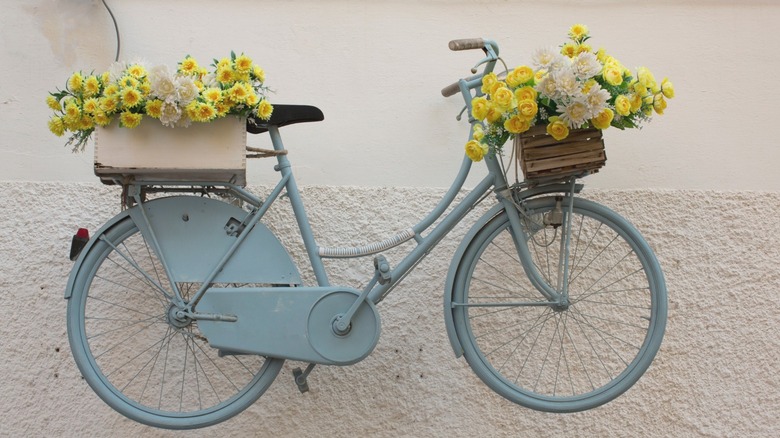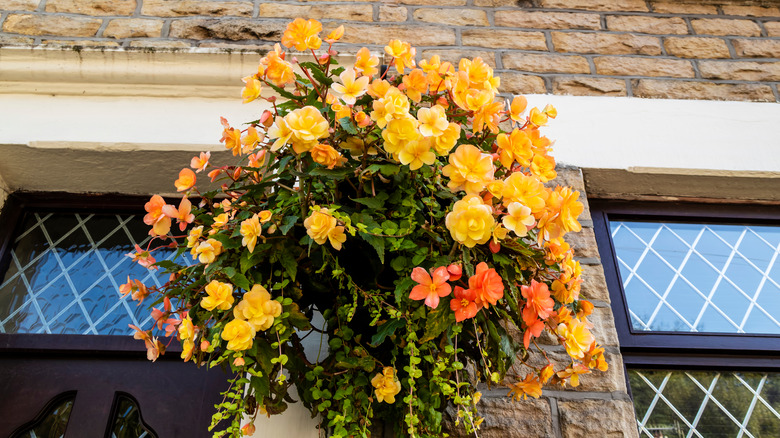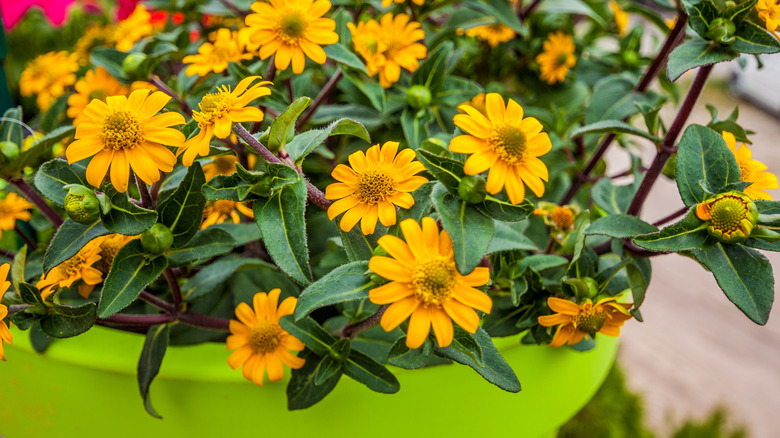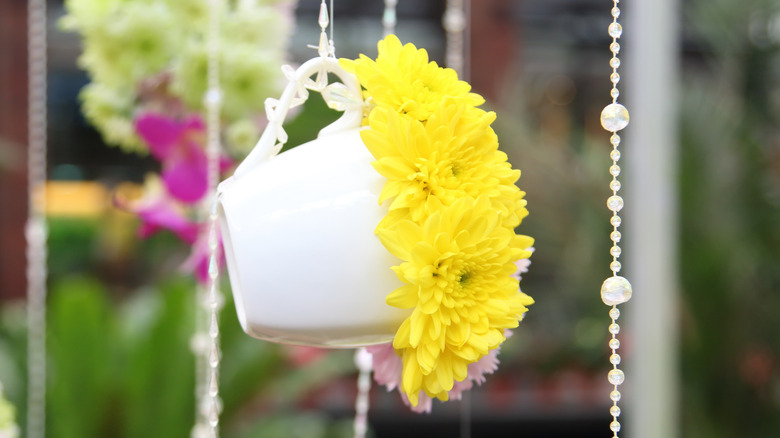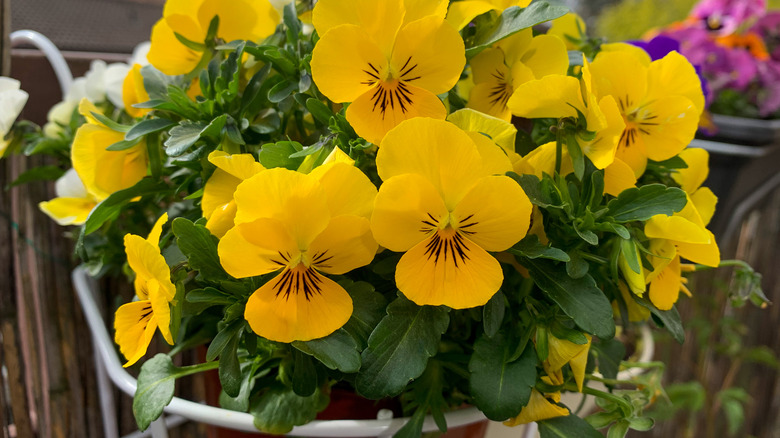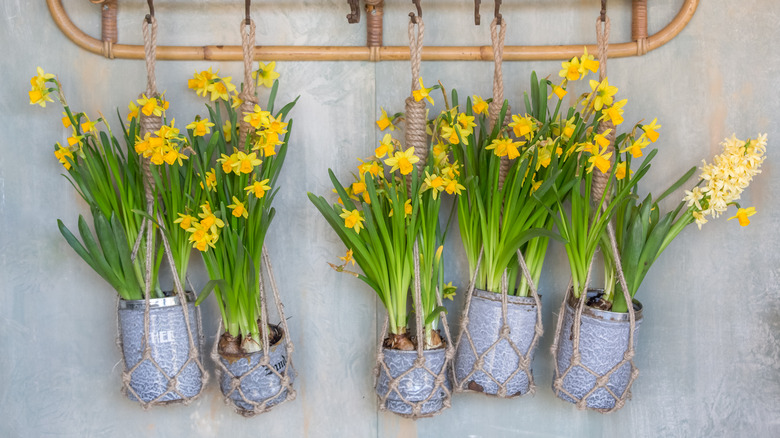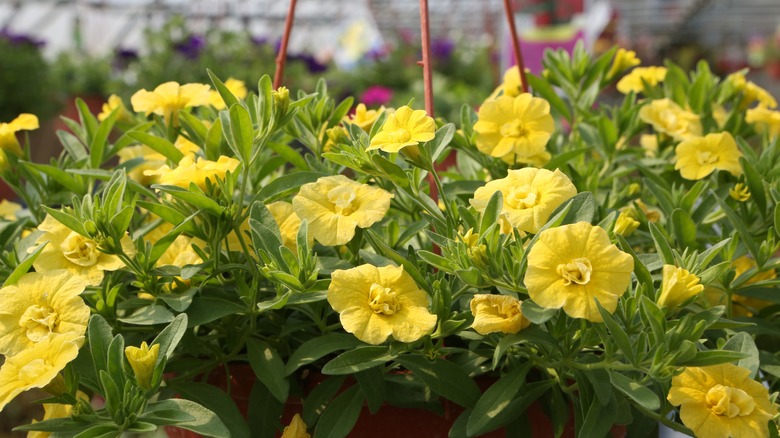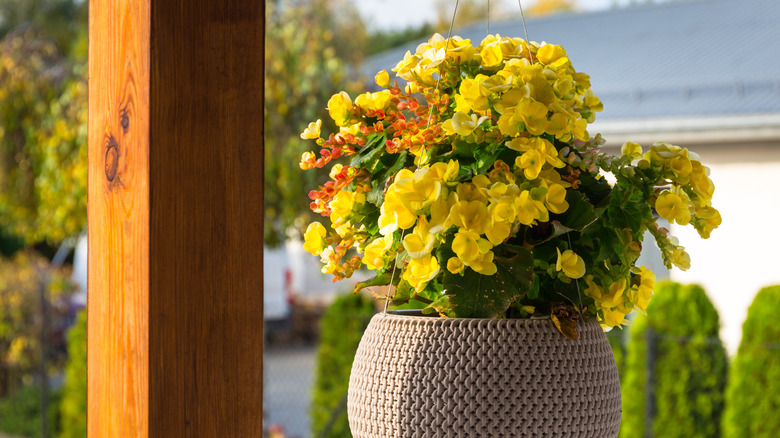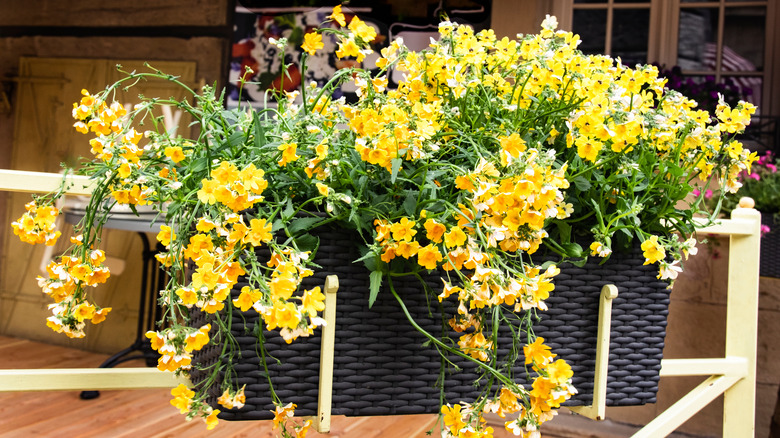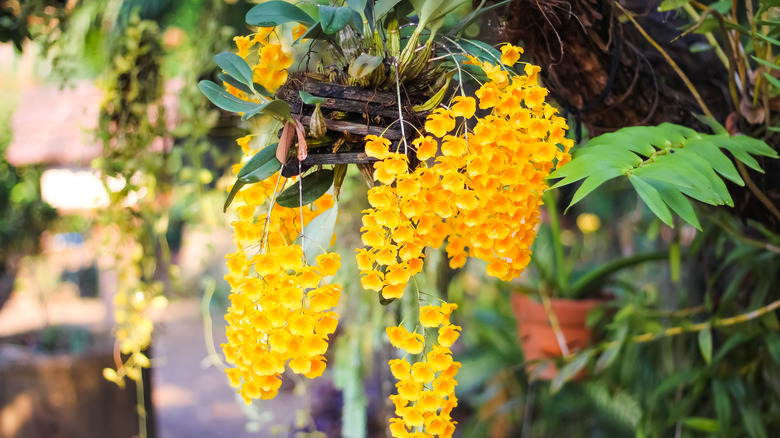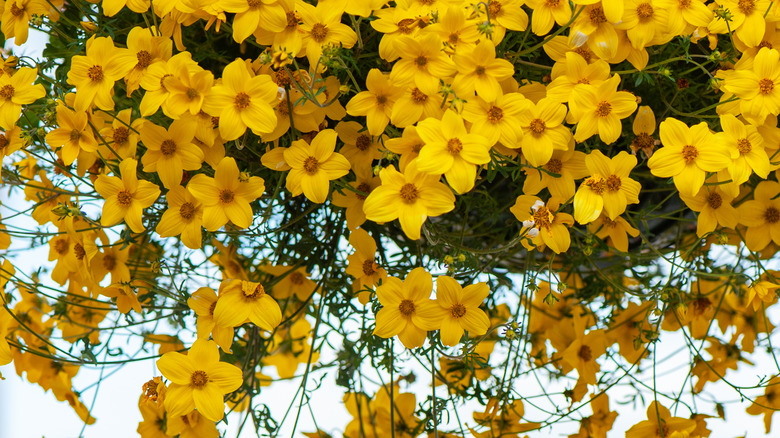10 Yellow Flowers Perfect For Hanging Baskets
Happiness. Optimism. Joy. These are just a few of the wonderful emotions symbolized by the color yellow. Brilliant golden-hued flowers raise those feelings up a notch with the ability to elicit a smile on just about anyone's face. Across the globe, cheerful yellow is the sign of the sun, per Color Matters. When the sun greets us in the morning, it can set us up to have a wonderful day. According to Petal Republic, however, yellow flowers are much more than chipper reminders to go live your best life. They exemplify long-represented cultural values in many different regions of the world, dating back to the ancient Maya of Central America. From royalty and wealth to honoring those who have passed, yellow means a lot of different things to a lot of different people.
Of all the colors in the spectrum, yellow is the one we humans notice first. This makes it an outstanding hue to add to your landscape and patio designs because it will definitely up your design game (and perhaps even your notoriety around the neighborhood). There may be a sinister side when it comes to the meanings associated with the color yellow, but we prefer to keep our chins tilted up toward the sunshine. Here are our top picks for vibrant yellow flowers that will grow well in hanging baskets while brightening up the palettes of all your outdoor spaces.
1. Begonias
Known as tuberous begonias, Begonia tuberhybrida produces a gorgeous flow of blooms with ruffled layers. Begonia tuberhybrida 'Nonstop Yellow' and 'Go-Go Yellow' both offer bright sunshiny colors. Begonias can sometimes be picky, but overall they are pretty tough. They are able to tolerate drought better than harsh direct sunlight.
Bloom Season: Late spring and summer
USDA Growing Zone: Winter hardy in zones 8 to 11
Growing Conditions: Indirect sunlight, dappled or part shade
Soil Type: Moist, well-draining; susceptible to root rot
Size: 10 inches tall and wide
2. Creeping zinnias
Creeping zinnias (Sanvitalia procumbens) are known to spread, per Better Homes & Gardens, which makes them an ideal addition to a hanging basket. Their creeping habit will spill them right over the edge around all sides of whatever container you choose for them. Creeping zinnias are a part of the same botanical family as common zinnias, but they are a completely different species.
Bloom Season: Spring, summer, and fall
USDA Growing Zone: 2 to 11
Growing Conditions: Part to full sun
Soil Type: Can tolerate almost any
Size: 6 to 12 inches tall, up to 18 inches wide
3. Chrysanthemums
The mighty chrysanthemum (Chrysanthemum x morifolium) has been around since the 15th century B.C., according to Almanac.com. Often referred to as mums, these reliable bushy blooms are loved for the splash of color they maintain in a barren landscape as deciduous tree leaves start to wither and fall with autumn's approach. Pinching small buds early will encourage larger blooms later.
Bloom Season: Late summer and fall
USDA Growing Zone: 5 to 9
Growing Conditions: Part to full sun
Soil Type: Well-draining; fertilize regularly with a standard 10:10:10 solution
Size: 1 to 3 feet tall and wide
4. Yellow violets
Viola cornuta is often called either a horned violet or horned pansy. Upon close examination of petals, violets can just barely be told apart from pansies, a close member of the Viola genus and another lovely flower for your baskets. Consider the Viola cornuta 'Scottish Yellow' for a top-notch bright yellow bloomer.
Bloom Season: Spring and early summer, typically stopping when it gets hot
USDA Growing Zone: 6 to 12
Growing Conditions: Full sun to part shade
Soil Type: Humus-rich; moist and well-draining
Size: 6 to 9 inches tall, 6 to 12 inches wide
5. Daffodils
Be the first to display hanging baskets early in the year with creatively strung daffodils (Narcissus spp.). These springtime delights are guaranteed to be a welcome sight to your neighbors as the promise of warmer weather finally begins to take hold. Per Almanac.com, these March birth flowers symbolize hope, new beginnings, and the spirit of rebirth.
Bloom Season: Early spring, one of the first to arrive
USDA Growing Zone: 3 to 9
Growing Conditions: Full to part sun
Soil Type: Neutral or slightly acidic
Size: 6 to 30 inches tall, 6 to 12 inches wide
6. Million Bells calibrachoa
Calibrachoa and Million Bells (Calilbrachoa spp.) are interchangeable names for these trailing flowers often thought to be small petunias. Both plants plus newer hybrids called supertunias are excellent options for hanging baskets flushed full of dazzling color. Calibrachoas often start blooming during the springtime and don't stop until fall has arrived.
Bloom Season: Spring, summer, and fall
USDA Growing Zone: Winter hardy in zones 9 to 11
Growing Conditions: Full sun to part sun
Soil Type: Moist, well-draining; for container growing, fertilize regularly
Size: 3 to 9 inches tall
7. Geraniums
Everyone loves a classic geranium, but did you know the yellow varieties only arrived on the scene recently? Yellow geraniums are still considered rare but they're certainly here to stay. Deadheading (removing spent blossoms) your geraniums is encouraged for a longer bloom period. Inquire about the Pelargonium hybrid known as 'First Yellow Improved' at your local nursery, or search for them through an online marketplace.
Bloom Season: Spring, summer, and fall
USDA Growing Zone: 10 and 11
Growing Conditions: Sun to partial shade
Soil Type: Moist but well-draining; fertilizer recommended
Size: Up to 16 inches tall, up to 12 inches wide
8. Nemesias
Originally from South Africa, nemesias (Nemesia spp.) like to flourish in sandy spots along the coast. They are part of the figwort, or Scrophulariaceae, family. They are typically grown for ground cover, but they also make great hanging basket companions. MasterClass suggests combing fragrant pollinator-friendly nemesias with pansies, snapdragons (a closely related cousin), and eye-catching blue lobelias.
Bloom Season: Early spring, summer, and fall
USDA Growing Zone: Winter hardy in zones 9 to 11
Growing Conditions: Full sun
Soil Type: Well-draining
Size: 6 to 12 inches tall and wide
9. Orchids
Here's something different that's sure to make your patio stand out from the rest. Dendrobium lindleyi orchids produce a cascade of small yellow flowers. Also called air plants, these epiphytes do not require soil and can grow on the surface of other plants. They receive their nutrients and water from the air around them. Another yellow flowering epiphyte to consider is the Coelogyne orchid.
Bloom Season: Spring and winter
USDA Growing Zone: 9 to 12
Growing Conditions: Dappled shade or partial sun
Soil Type: Orchid specific
Size: 4 to 12-inch long racemes with 1-inch wide flowers
10. Apache beggarticks
Though it may seem, Bidens ferulifolia was not named after a U.S. president; however, they do have some strange nicknames, including Apache and fern-leaved beggarticks. Their playful daisy-like blooms can reach up to 2 inches in diameter. These are also excellent for attracting bee and butterfly pollinators.
Bloom Season: Early summer into fall
USDA Growing Zone: Winter hardy in zones 10 and 11
Growing Conditions: Full
Soil Type: Well-draining; will tolerate partly dry
Size: 18 inches tall, 12 to 36 inches wide
